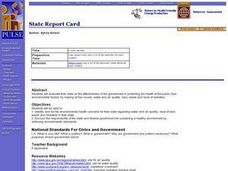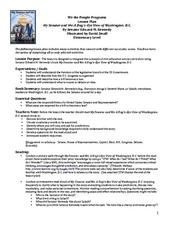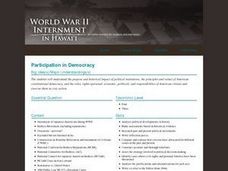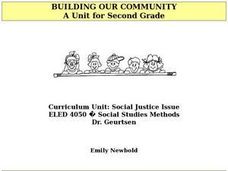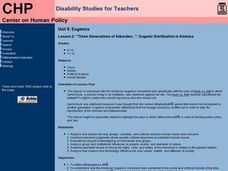Curated OER
Martin Luther King and Writing as a Tool for Social Change
Young scholars explore writing as an agent for social change. In this Social Studies lesson, students examine the power of writing using Dr. King's Letter from a Birmingham Jail. Young scholars will practice the technique of persuasive...
Curated OER
Put Your Hands in Mine: King Day
Students examine the concepts of human and civil rights. In this philanthropy lesson, students watch The Mighty Times: The Children March. Students discuss concepts relating to civil rights and change.
Curated OER
Mandela The Man
Ninth graders explore civil rights by reading several biographies. For this Nelson Mandela lesson, 9th graders discuss the trials and tribulations Nelson Mandela had to face in South Africa and how they were similar to the problems...
Curated OER
Learning About the Civil Rights Movement Through Photographs
Students examine the racial inequality that existed in the United States before the Civil Rights Movement. After listening to song lyrics and viewing photographs, they discover the importance of the movement in helping society move...
Curated OER
Rosa Parks
Students examine the actions of Rosa Parks. They identify the reasons why philanthropy is good for the community and individuals. They write a letter to someone they admire because of their qualities.
Curated OER
State Report Card
Twelfth graders evaluate their own state on how well the government protects their citizens from specific health issues. In groups, they list the environmental health concerns regarding water, air, toxic waste and radiation. They...
Curated OER
Michigan Court System (Part 1) (Middle School)
Young scholars identify the courts that make up the Michigan judicial system. They explore the responsibility of each court and diagram how cases move to the Supreme Court. They compare and contrast the different types of courts.
Curated OER
America¿s Leader
Learners examine the roles and responsibilities of the President of the United States. Using their textbook, they discover when the presidency was formed, how it works and what kind of power the President has. They also discuss how the...
Curated OER
Youth Engagement
Students examine and then discuss opposite sides of controversial issues such as neighborhood curfews, lowering voter age, etc. They learn civic responsibility and cultivate tolerance for others' opinions.
Curated OER
My Senator and Me: A Dog's-Eye View of Washington, D.C.
Although this legislative process lesson is designed to accompany a specific text, it is valuable independently. Young learners participate in a picture walk (worksheet included) through My Senator and Me: A Dog's-Eye View of Washington,...
Carolina K-12
Preventing Voter Fraud or Encouraging Voter Suppression?
The issues of voter fraud and voter suppression are relevant in every election, local as well as national. Soon-to-be voters learn about a recent bill proposed in North Carolina, the Voter Information and Verification Act, and decide for...
National Endowment for the Humanities
Revolution '67, Lesson 1: Protest: Why and How
To some people, protesting is as American as apple pie, but the factors that lead to protests can be as confusing to veteran activists as to today's youth. Revolution '67 explores the riots in Newark, New Jersey as a case study. Using...
Curated OER
Understanding Treaties: Students Explore the Lives of Yakama People Before and After Treaties
Students analyze treaties made between the US government and Native American tribes. In this government lesson, students evaluate bias emotionally connect with what was gained and lost during the late 1700's. This is a 3 part lesson...
Curated OER
Black Kentuckians and the Civil War
Students demonstrate how the American Civil War affected black Kentuckians socially and politically. They identify and discuss the 13th Amendment to the U.S. Constitution, which forced the end of slavery in Kentucky months after the...
Curated OER
Education: Passing Enough Knowledge to Survive to the Next Generation
Students compare and contrast the knowledge requirements for human and animal children. They identify the consequences of an animal if it is unprepared for the given environment. They discover the importance of education as well.
Curated OER
Participating in Democracy
Young scholars analyze film clips in class. For this democracy lesson, students identify the differences between civil liberties, democracy and freedom. Young scholars view a video regarding Japanese internment and answer study questions...
Curated OER
It's A Free Country, Isn't It?
High schoolers examine immigration into the United States. They identify the rights and responsbilities of being a citizen of this country. They create a new verse to be included in the National Anthem.
Curated OER
Building Our Community
Second graders examine the different relationships within communities. They discover the need for rules and organization. They identify their role in the local community as well.
Curated OER
The Abolitionist Movement
Middle schoolers examine the Abolitionist Movement in Delaware. In groups, they examine a petition presented to the general assembly and an anti-slavery broadside. They compare and contrast the two documents and develop their own...
Curated OER
The Cold War and Development of Post-War America
Students view examples of political advertisements during the years of 1952 through 1964. After viewing, they discuss how the Cold War and the threat of Communism affected the development of the United States. They compare the Cold War...
Curated OER
Influencing the Agenda: The Impact of Interest Groups on Policy Making
Middle schoolers examine the role of interest groups and how they affect voters. In groups, they research how the groups have affected policy making in the county. They examine a specific issue and discover whether or not a vote was...
Curated OER
Your Role as a Taxpayer: Why Pay Taxes?
High schoolers evaluate the basic rationale, nature, and consequences fo taxes. They describe why governments need taxes as revenue to provide goods and servicesin this series of activities.
Curated OER
Preserving and Promoting Democracy
Eleventh graders create surveys to determine whether or not young people have or plan to vote. Using their findings, 11th graders make advertisements aimed at encouraging youth to vote.
Curated OER
Three Generations of Imbeciles...": Eugenic Sterilization in America
Pupils examine the Eugenics movement in America with the case Buck vs. Bell, in which a woman was sterilized against her. They examine how science has been influential in forming public policy. They write a short paper on their findings...







